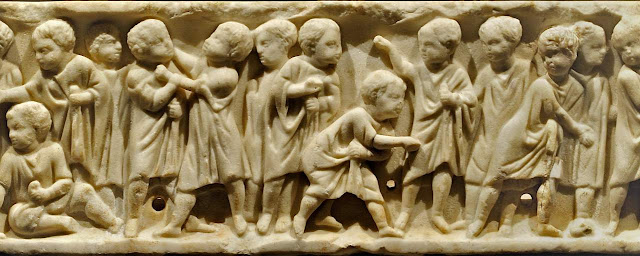- Of Children
The stages in a child's life were considered under Roman Law to be as follows:
+ Infantia (infancy)
The child is unable to speak properly and, hence, is lacking in intellectus (intelligence) and judicium (powers of judgment). Children at this stage were considered incapable of possessing legal capacity.
+ Infantiae Proximus (next to infancy)
The child, at this stage was able to speak, but was lacking in intellectus and judicium. At the time of the later Empire, intellectus was presumed to exist at seven years of age, at which infantia ceased.
+ Pubertati Proximus (next to puberty)
The child lacked judicium, but could perform transactions which bound another party, although he was unable to bind himself without auctoritas tutoris (the authority of his tutor).
+ Pubertas (puberty): 14 (male), or 12 (female)
At this age full legal capacity was assumed.
Note: The jurists, prior to Justinian, had differed as to the test for determining the puberty of a male. The Proculians, for example, had suggested the age of 14; the Sabinians had thought that age should be determined solely by physical capacity (habitu corporis).
- Of Women
Roman Law did not grant women equality with men. Women were not allowed to participate in public life and could not hold public office. They were not allowed to adopt and, in earlier times and in the classical period, they could not enter formal transactions without a tutor's authority.
- Of Prodigals
The prodigus (spendthrift) possessed full legal powers. But a Praetorian interdiction prevented him from dissipating his property if it might have resulted in his children's reduction to poverty. During the classical period this applied to any dealings which might have been detrimental to his own property. The prodigus was obliged to have a curator.
- Of Lunatics
Furiosi (furor = lunacy) lacked full legal capacity although, following the classical period, a contract entered into by a furiosus during a lucid interval was held to be valid. The furiosus required a curator.
----------
- Tutors and curators in Roman Law
+ Tutors and curators (II): Tutela Impuberum
+ Tutors and curators (III): Tutela perpetua mulierum
+ Tutors and curators (IV): Cura
----------
Source:
Roman Law, L. B. Curzon, pages 49 - 50.
